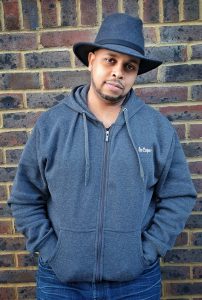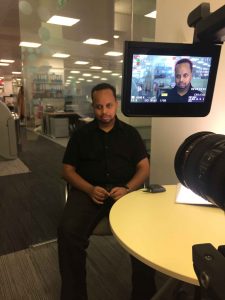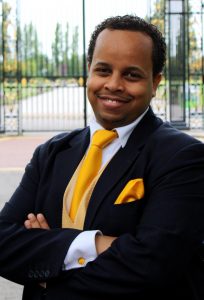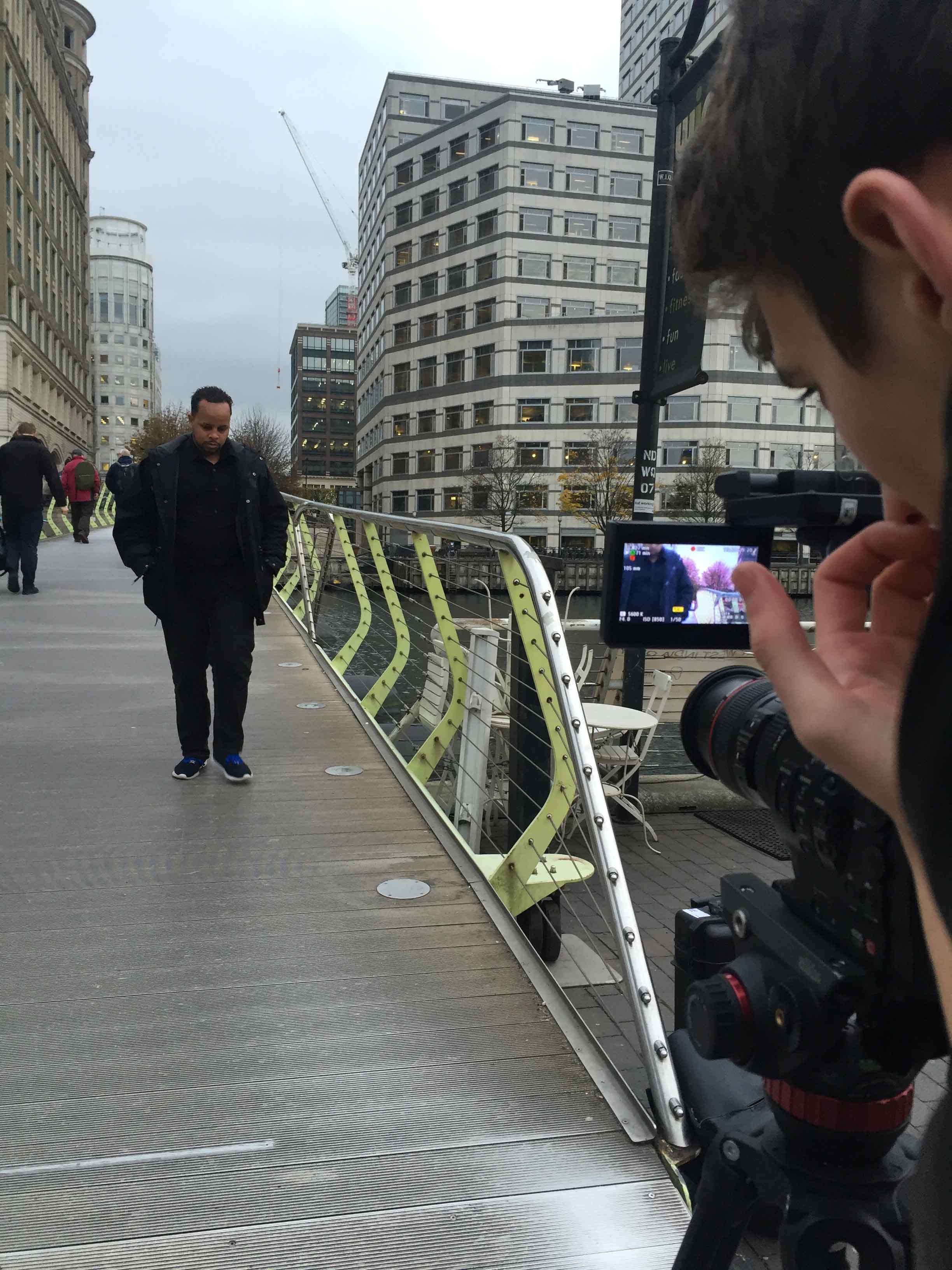Temesghen Debesai began his career in Eritrea, where he worked as a news anchor and co-founded the country’s first English television service in 1998. In 2006, he fled Eritrea and was granted refugee status in the UK.
He joined the first cohort of the Refugee Journalism Project in 2016, and went on to work as a freelance journalist for the Thompson Reuters Foundation and BBC World Service.
Temesghen is now a recipient of the Beyond Borders Bursary and is currently completing an MA in Television at the London College of Communication. This month he launched ERI Hope Media which focuses on Eritrean topics.
Words by Emma Djilali
Interviewer: What led you to pursue a career in journalism?
Temesghen: I graduated with a degree in English, and had taken minor courses in journalism. I did not think I would end up in journalism.
But I finished top of my class in Eritrea, and when the Ministry of Information decided to set up an English department – Eritrea’s first English television station – they contacted the university and said “we need fresh graduates, is there anyone that has the potential to set this project up?”
The university consulted the head of the journalism department, and my former lecturer remembered me. He showed up at my house and said, “Listen, they’re setting this thing up – you’ve got to go.”
And this is like, two weeks after graduation. I’m still a fresh graduate, I’m still trying to figure out what I want to do next, and he’s telling me “you’ve got to do this.” I was like “ok, let’s check this out.” And the rest is history.

That was back in ’98, and I stayed with the station for eight years. We went on to expand the programmes to include documentary films, interviews, panel discussions and a music programme. But obviously we have problems in Eritrea.
Eritrea shares a border with Ethiopia and the Red Sea, and we have a totalitarian government, and there is no freedom of the press, no freedom of speech – there’s an abysmal human rights record in the country.
As a journalist, it was very hard to carry on living in Eritrea and I just had to wait for the right opportunity to leave the country. In 2006, I managed to get out, and I ended up in London.
Interviewer: After you arrived in London, did you continue to work in journalism?
Temesghen: I ended up working in a different area. It was to a certain extent connected with my field because I was with a media monitoring company.
We were monitoring all the media outlets that come out of the United Kingdom, including all the BBC channels, CNN, Sky, the Financial Times – and all the radio stations. I did that for about seven years, and was still kind of…in touch with journalism. But not in the way that I would like.
Interviewer: It can be a difficult transition for anyone who’s had to leave their home country and come to the UK, or anywhere that’s quite different from home, and what they’re used to. How did you find that in terms of coming here and entering the job market?
Temesghen: I think there are two major factors when you come from another country, whether it’s to the UK or any other part of Europe or North America. The first is, how good is your English? Because language can be a major barrier. If you don’t have the right communication skills, then you’re in trouble. In my case I was blessed, because I’ve always spoken English so I don’t have a problem with that.
Sometimes you have the right qualifications but it’s not just about what you have to offer… it’s about who you know.
But despite the fact that my communication skills were up to par, the next problem is networking –knowing the right people. Sometimes you have the right qualifications but it’s not just about what you have to offer… it’s about who you know.
You need to be able to get in touch with the people that are within the industry that you want to join. If you don’t know people, then you’re stuck. You need someone to say, I know this person, check out his experience, check out what he’s capable of doing.
This was all very frustrating and I really had to weigh my options, and think about whether maybe I have to move into a different career path, because it kind of felt like a dead end.
Interviewer: Especially in a city like London, you get to a point where it’s like – in order to keep paying the rent you’ve just got to pick anything, really, to do.
Temesghen: Exactly. And I think the timing of my arrival in the UK was bad because Europe was going through an economic recession. In 2006 and 2006 companies were actually letting people go, a lot of people were being shown the door, and you think: hold up, these people have been in there for quite a long time and they are losing their jobs, chances of a newcomer getting in is going to be close to zero.
Interviewer: One of your colleagues from the Refugee Journalism Project, Zabihullah Noori, also made an interesting point – which is that foreign journalists actually have a lot to bring to the UK industry in terms of their expertise and in-depth knowledge. Even though this expertise is not always recognised.

Temesghen: Absolutely. Noori and I worked together because we did an internship at the Thompson Reuters Foundation. And when we were there, we were able to provide TRF stories that I’m pretty sure they would not have been able to have access otherwise. Because we had personal connections with people.
They wanted stories from Eritrea – I had the connections to the people directly involved. We were able to get a hold of them, talk to them, get their perspective. And it was a lot easier for them to talk to me than a foreign journalist because there’s more trust there.
When you have a foreign journalist approaching, you don’t exactly know what angle she’s coming from. When you have someone like myself talking to you, someone who’s an insider, then you would feel more comfortable telling your story the way you’d actually want it to be told.
Interviewer: As a journalist, is there a particular area or set of issues you’re most interested in covering?
Temesghen: Because of my background, and because of the social and political injustices that I’ve seen in Eritrea, my main interests are always the stories of refugees, migrants, and social injustices wherever they may be, though particularly Africa.
As a broadcast journalist I mainly work in current affairs, presenting the news. Both these areas interest me – both making documentaries about social injustices – factual documentaries – as well as broadcasting.
Interviewer: You mentioned that having a network is key to succeeding as a journalist in the UK. How was this facilitated by the Refugee Journalism Project, and in what other ways did you benefit from the project?
Temesghen: Well for starters, it was a great opportunity to meet other foreign journalists, other refugee journalists like Noori and the others.

It kind of makes you feel like you’re not alone in this journey, while you’re trying to actually get a foot into the industry, get a foot in the door. [The project] enabled me to actually share my experiences and understand the experiences of other people that were going through something similar. Everyone has a story to tell, everyone has skills, but on top of this you have the language and networking requirements, and not everyone can get there alone.
At the same time, London is a very diverse city and a lot of refugee journalists can actually work with stations that broadcast in their own languages – like Noori is now working for an Iranian TV station, and he’s blossoming in that role, but this is partly a result of the exposure, I think, that we gained through the RJP.
Interviewer: Was it immediately after the project that you decided to pursue a Master’s degree, or did you take a bit of a break?
Temesghen: After the project, I had the chance to work for the BBC World Service for about four months. In some parts, though not directly, my experience at the Thompson Reuters Foundation helped in securing that position.
After that, I got the opportunity to do my Master’s at the London College of Communication, which is being fully funded through a scholarship that was set up as a result of the Refugee Journalism Project. So again, this is another advantage of having been part of that project. I don’t think I would have been able to afford to do my Master’s if it wasn’t for the funding that I received.
